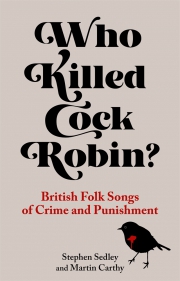Transcript
At the heart of traditional song rest the concerns of ordinary people. And folk throughout the centuries have found themselves entangled with the law: abiding by it, breaking it, and being caught and punished by it. Who Killed Cock Robin? is an anthology of just such songs
Many years ago, when he was compiling his first folksong anthology, The Seeds of Love, Stephen Sedley noted a large number of traditional songs, many of them unpublished, about crime and punishment. Fifty years on, retired now from the judicial bench and working with the celebrated singer and instrumentalist Martin Carthy, he has returned to these materials.
In the intervening years research has been transformed from combing manuscripts and scrapbook collections to digitised cataloguing and cross-reference – an embarrassment of riches.
The resulting anthology is a combination of songbook and legal history. Songs are grouped crime by crime (poaching, riot, homicide, piracy, arson and so on) and punishment by punishment (transportation, prison and the gallows). Some have been editorially difficult to handle – for instance the group of incest ballads, and songs involving sexual assault. Choices have sometimes had to be made: the recurrent misogynistic songs found in oral tradition find no place here.
There are still things to be discovered. Many people will know the ballad (recorded in the 1950s by Ewan MacColl) of the young soldier McCaffery, who has been driven by unjust treatment to shoot the officer who has victimised him, but instead kills the colonel of his regiment and is now to hang for it. Traditionally the ballad puts McCaffery in the 41st or 42nd regiment of foot, but neither regimental history contains any trace of the drama. If, however, you go to the history of the 32nd Foot, it turns out that the story is even more dramatic than the tale told by the ballad. Far from being confined to barracks for weeks on end until he loses his reason and then shooting the wrong officer, McCaffery had got hold of a rifle hours after being court-martialled. He had fired at Captain Hanham, who was walking with Colonel Crofton: the round first passed through Crofton’s chest, then lodged in Hanham’s spine, killing them both, and McCaffery was hanged for two murders at Liverpool in 1861.
Although the ballad-maker has if anything underplayed the drama, and although McCaffery’s role was less than heroic, a hundred years later it was still considered an indictment of military discipline and it was widely believed that it was a military offence for troopers to be heard singing it.
Most folk songs, by contrast, make no pretence at authenticity: the truths they tell are not tied to a time or place, and they display a wealth of poetry and melody which is still insufficiently recognised.
Who Killed Cock Robin? by Stephen Sedley and Martin Carthy is published by Reaktion Books, £14.99
The online launch of Who Killed Cock Robin? was a great occasion with songs from the anthology by participants Peggy Seeger, Martin Carthy and Eliza Carthy.
Stephen Sedley was appointed a High Court Judge in 1992 and an Appeal Court Judge in 1999, and on retiring from the Bench in 2011, Visiting Professor of Law at the University of Oxford.
Martin Carthy MBE is a singer and guitarist and one of Britain’s most highly regarded folk musicians. In 2014 he received the Lifetime Achievement Award at the BBC Radio 2 Folk Awards.
Tags: Crime and punishment, Folk ballads, Traditional folk songs


Subscribe with…